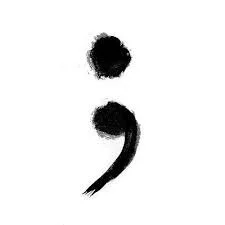Friends,
I was talking to a wise spiritual friend recently and we were sharing the ups and downs of the present moment, particularly how this second wave of loneliness and stress and all the rest is somehow different than the first wave of sickness. You can follow the first wave (read first wave as physical illness) in the newspaper; the second is more subtle, more particular to each person, and, while less physically harmful, so much more soul-depleting. This wise friend said something, well, wise.
With a brief heads-up that he was about to “nerd out” with a reference to English grammar, he told me this moment has taught him to really, really appreciate the semi-colon; you know, the punctuation that allows you to join two complete thoughts together (two sentences) to make one sentence. “Thank the Good Lord for the semi-colon,” he said, in a treacly drawl. Take for example a short sentence like “This stinks.” What if you don’t punctuate that short and gloomy thought with a period, or more temptingly an exclamation point, but with a semicolon? What does that communicate? Well, the semi-colon allows you to affirm that this is a complete thought — the present moment does, by just about every metric, stink — and yet more things can still be said within the same breadth. Notice how the semi-colon allows you to speak truthfully with multiple thoughts cohering, even as it allows you to nuance this same reality. “This stinks” doesn’t have to be a dead-end street, or an exclamatory cry. The semi-colon expands what is possible. It makes speech, and the world that generates speech, richer and more textured.
“This stinks; and hope has never been sweeter.” “I am tired; I give a mostly full-hearted thanks for a God who lets me rest.” “I am lonely; I’ve discovered who it is I really love, and who it is who really loves me.” Perhaps the semi-colon lets multiple things be true at once. And for that reason, it is the great symbol of hope.
My favorite use of this little sign of hope was for our Drive-In Choral Evensong on November 1st. It was so good for all of us to be gathered around our choir. Those of you there know that “it was rainy, and it was cold; and yet, over the radio beautiful music and community were shared.”
And so, as we enter into Adventide and the Christmas season, it’ll be something for us to lean into. At every turn, there is a reasonable thought that bubbles up that asks us to notice what is difficult and hard and lacking in the present circumstances. These thoughts are as true as they are wearying. And as most negative thoughts go, they manifest with an immediate and exclamatory urgency. And yet, there is possibility to not let them be complete sentences, final assessments on what is real and true — something can follow; something no less true can follow.
And so, friends, remember the rich spirituality contained in a little mark of punctuation. As you gear up for another week of zooming around; as you think ahead to the holidays; as you make difficult decisions about the people you see, and others that you won’t be able to see; as you struggle and laugh and plan and putz around the house another day; as these days become shorter and the nights longer; in all this, don’t forget the semi-colon. You can always say something that is true and raw and honest, and all the while, after a moment’s reflection, give space for something else that is just as true and real and hopeful.
To put this reflection in a slightly more theological key, I’d say the semicolon is the hinge on which two simultaneous realities turn. The first is our humanity, our honesty, our truthful witness to where we are, the words that feel like the urgent beginning of a sentence – the “this stinks” side of things. The other side of the semi-colon is God. After the pause, after the “;”, after the breath — whatever it is that opens, I’d call it God; the One who releases the rich and nuanced mysteries of the present moment. “There is no room in the inn; God always makes room for himself.” “Though we die; yet shall all live.” The paradoxes of scripture hinge on the semicolon. Honest humanity is connected to Hope-filled divinity. And while their connection isn’t always straightaway apparent, they are held together by a mysterious reality.
Might this season of Advent and Christmas, where we welcome the one who is fully human and fully God, be a time we allow a few more semicolons into our lives? If we are created to give thanks in all things, to even find God in all things (which I believe we are), even in this moment, we will need a Savior of the semicolon.
Garrett+

